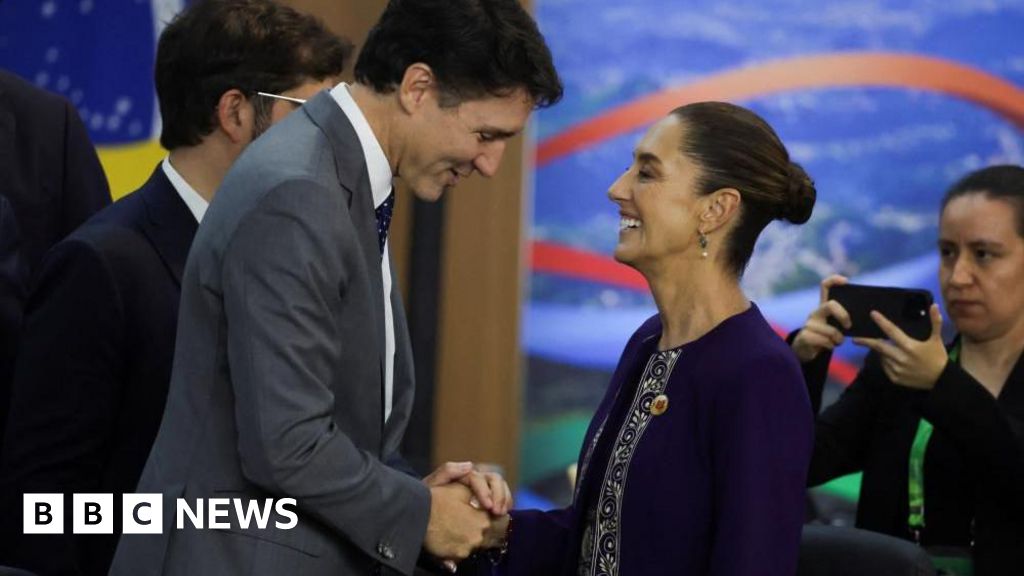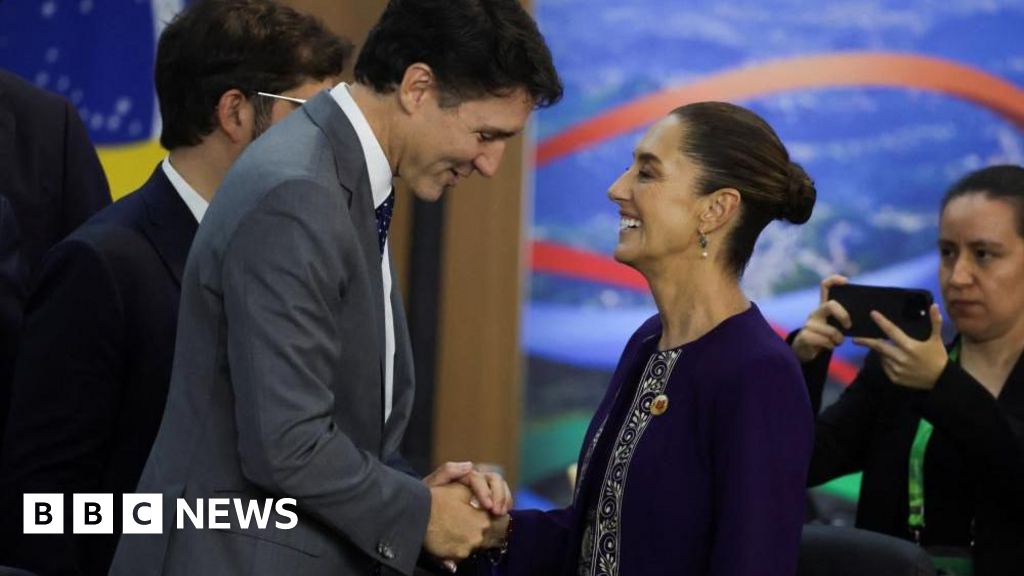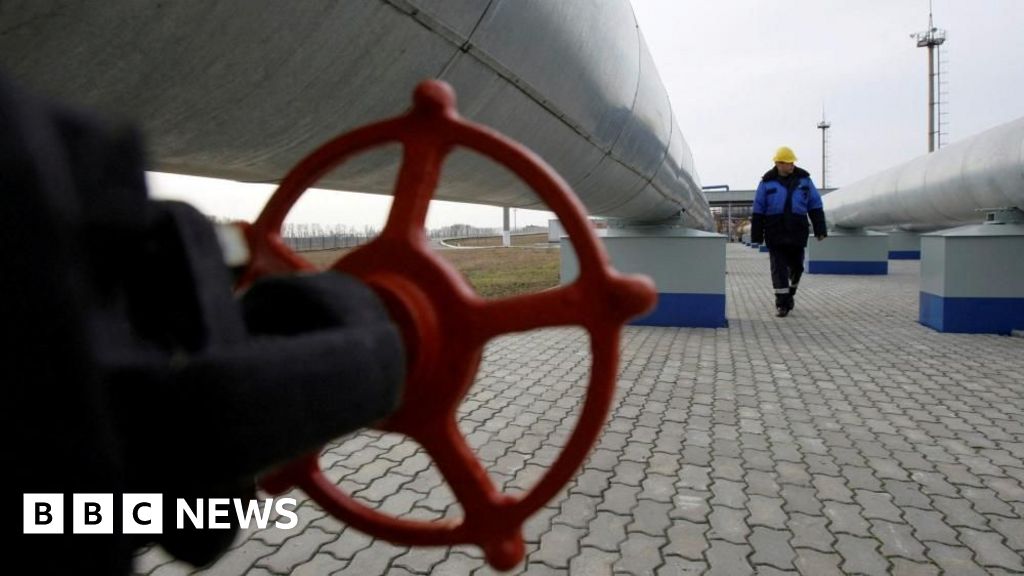
Canada is being accused of throwing Mexico under the bus amid a tariff threat ahead of President-elect Donald Trump’s second term in the White House.
Last week, Trump threatened he would impose a blanket 25% tariff on both countries when he takes office in January unless they secured their shared borders with the US.
Canadian officials were quick to distance their country’s border issues from those of Mexico, arguing that drug smuggling and unlawful crossings at the southern border were much higher, and that Mexico was serving as a “back door” in North America for Chinese investment.
Those remarks have not gone unnoticed in Mexico.
Mexican President Claudia Sheinbaum told the Associated Press this week that “Mexico must be respected, especially by its trading partners”.
She added that Canada had its own social problems with fentanyl use, adding the country “could only wish they had the cultural riches Mexico has”.
Sheinbaum’s remarks came after Canada’s US ambassador, Kirsten Hillman, told the news agency that during a recent dinner at Mar-a-Lago, Trump’s Florida residence, Prime Minister Justin Trudeau told the president-elect that the northern border was “vastly different than the Mexican border”.
Doug Ford, leader of Ontario, Canada’s most populous province, said last week that lumping Canada and Mexico together on border security – given the differences between the two boundaries – was “the most insulting thing” he has heard from the US, a long-time close ally of Canada.
Canadian officials have also tried to position the US and Canada as a united front against China, while saying they share concerns that China was using Mexico as a backdoor to flood the North American market with cheap imports.
In October, Canada imposed a 100% tariff on imports of Chinese-made electric vehicles (EV) after similar announcements by the US and European Union.
The country also plans to impose a 25% duty on Chinese steel and aluminium.
Mexico has not levied a similarly steep tariff.
At the moment, all three countries are under a North American trade agreement that was renegotiated during Trump’s first term. It is up for renegotiation again in 2026.
But tensions with China prompted Ford to repeatedly call for separate bilateral trade deals between Canada, the US and Mexico – a proposal that has been backed by Danielle Smith, leader of Canada’s oil-rich province of Alberta.
“They’ve had an opportunity to fix these concerns for years and they just don’t want to,” Ford said in late November.
Trudeau has said that while Canada preferred Mexico remain a united North American trade partner, “we may have to look at other options” if the country doesn’t address China trade.
Marta Leardi-Anderson, the executive director of the Cross-Border Institute at the University of Windsor – an Ontario city connected by a bridge to Detroit, Michigan – said Ford’s comments are likely a reflection of Ontario’s deep reliance on its US trade relationship.
The province is at the heart of the highly integrated auto industry in Canada, and trade between Ontario and the US totalled more than C$493bn ($350bn) in 2023.
“That’s a huge amount of economic energy from just one region of the country,” Ms Leardi-Anderson said.
She added that Trump’s views on tariffs and border security have forced Mexico and Canada – also long-time allies – to dissect the shortcomings in their relationship in ways they have not done before.
These comments were seen as a betrayal by Mexico’s lead trade negotiator, Gutierrez Romano, who told Canadian newspaper the Globe and Mail last week that “it is not rational to be divided against the United States”.
Ford’s comments and Trudeau’s perceived silence about them were also seen as offensive by some of the Mexican public, says Oliver Santín Peña, a professor at the National Autonomous University of Mexico.
“Ultimately, it is not a good time in the bilateral relationship [between Canada and Mexico],” Mr Peña told the BBC, noting the nations have enjoyed a steady relationship for 85 years.
He said Sheinbaum’s response signals that she will stand up for Mexico when needed, but she is likely not seeking to open a two-front trade war with Trump and Trudeau.
“She would not fall for provocations,” Mr Peña said, but also wants to communicate “that her country should be respected”.
Sheinbaum, who took office in October, is still establishing herself in the role and the country’s first woman president and has taken the position that Mexico is to be respected as a full and equal partner, particularly by its North American neighbours.
“I always will defend Mexico and Mexicans’ rights, including those based in the United States,” she told the BBC on the campaign trail when asked her about the possibility of working with a second Trump administration.
While both the northern and southern US borders have reported unlawful crossings and drug seizures, the numbers at the border with Canada are considerably lower than those at the Mexico border, according to official data.
US border agents have seized 43lbs (19.5kg) of fentanyl at the northern border between October 2023 and this September, compared to more than 21,000lbs at the southern border.
Over the same period, there were just under 200,000 migrant encounters at the northern border, and more than two million at the southern border.
Canada has promised to beef up border security since Trump’s surprise tariff threat.
Meanwhile, Sheinbaum has shared her country’s immigration strategy with Trump while emphasising her view of “respecting human rights”.
“We reiterate that Mexico’s position is not to close borders but to build bridges between governments and between peoples,” she has said.
Crossings at the US-Mexico border dropped sharply this summer after reaching record highs earlier under the Biden administration, in part due to efforts by Mexico to implement measures like setting up new checkpoints and increasing patrols.
Since Trump and Sheinbaum spoke on the phone following the tariff threats, Mexico has also made what it says is a record seizure of fentanyl – some 1,500 tablets with an estimated value of around $400m.
Mexico, China and Canada together account for more than a third of the goods and services both imported and exported by the US, supporting tens of millions of American jobs.
About 75% of Canada’s exports go to the US, and Canadian imports to the US are valued at $430bn, according to the United Nations Comtrade database on international trade.
Mexico is the top trading partner of the US with imports valued at $480bn.
With additional reporting from Will Grant in Mexico



